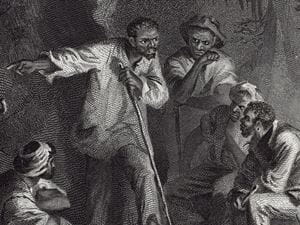
With the release of “Birth of a Nation,” the grim story of Nat Turner has been thrust to the forefront of public thought. A complex and controversial figure, Turner’s actions resonate today, forcing us to consider the implications of violence as a response to oppression.
It’s February 12th, 1831. A slave preacher, waiting from a sign from God, witnesses a solar eclipse. As the sun darkens, he makes a decision.
The decision to kill.
Born into slavery on the Benjamin Turner plantation in Southampton County, Virginia, in October of 1800, Nat Turner was a highly intelligent child, learning to read at an early age. Born with marks on his chest that others regarded as the marks of a prophet of God, and his natural oration skills did nothing to disprove this. Turner often officiated Baptist worship services, preaching to his fellow slaves, who knew him as “the Prophet”.
As he matured, Turner looked to scripture in an attempt to understand the reason behind the enslavement of African Americans. Early in life, he inferred that slaves should remain obedient to their mortal masters. This view wouldn’t last long, however.
Turner would go on to have a series of visions—prophesies—that changed the way he looked at the enslavement of his people.
“I had a vision,” Turner is quoted as saying in “The Confessions of Nat Turner,” “I saw white and black spirits engaged in battle, and the sun was darkened … the thunder rolled in the heavens and flowed in the streams.”
Convinced by these prophetic visions that he was to unite and lead his enslaved people, Turner felt it his destiny to overthrow his white masters. He waited to act—waited for years for a sign from God. And on that day in February of 1831, he found it in that fateful eclipse.
Upon seeing the sun disappear in shadow, Turner quickly drew four other slaves to himself, and told them of his plans, setting the date of the rebellion for July 4th.
His plans were delayed when he became ill, however, and July 4th came and went without event or violence.
But on August 13th, Turner beheld what he felt was another sign—the sun shimmered a mysterious bluish green in the sky, the effect of volcanic dust in the atmosphere.
On the 21st of August, Turner gathered a sizable group of slaves in the sheltering woods. Together, they dined, and took an oath to kill any slave owners they came across—men, women, and children. No one was to be spared. They decided that the axe would fall first on Turner’s master, Joseph Travis, and the man’s family.
Thus began Nat Turner’s Rebellion, a wave of violence whose blades claimed the lives of up to 60 people, resulting in the deadliest slave uprising in the Southern United States.
As Turner’s men swept through home after home, hatchets in hand, they spared no one, killing infants, children, men, women—everyone. Turner felt that indiscriminate slayings would instill a sense of shock into slaveowners, making them less effective fighters.
Turner freed slaves as they went, and up to 75 additional bodies joined the rebellion as it rolled through eleven different plantations over the next two days.
Their destination was the town of Jerusalem, where Turner believed there was an armory that he and his forces could use to further their cause.
They never made it. After two days, the group was scattered by the local militia, which greatly outnumbered them, and the majority—around 50 men—were captured and brought to trial. Eighteen were executed. The rest were sold or returned to their masters.
Turner, himself, remained hidden in the forests for around 60 days, and was finally discovered by a farmer on October 30th.
He surrendered, and was sentenced to death on November 5th, 1831, charged with “conspiring to rebel and make insurrection”. By the 11th, he was hanged, and possibly decapitated, quartered, and skinned.
In the aftermath, the white community imposed a crackdown on slaves, and militias began a campaign of violence against both free and enslaved blacks throughout the area. Hundreds were killed that had nothing to do with the rebellion. The violence continued to reverberate for months, and laws were passed that limited blacks’ ability to gather in groups.
Today, nearly two centuries after his death, the impact of Nat Turner’s actions still ring out like the echoes of a great, brass bell, the sound resonating through contemporary issues of social justice.
Those actions raise questions. How do you stand up to enforced oppression? What role does violence play in this? What tools of resistance did people have in the 1800s versus what tools do we have today?
This is the kind of conversation that “Birth of a Nation” engages us in by directing our attention to a horrific event in an even more horrific past. The wanton killing committed by Turner and his men strike some as unnecessary—as abject murder.
For others, the killing of noncombatants was a necessary evil—the desperate swings of a man with a stick fighting a knight with a sword. After all, what tools really were available to Turner, to those enslaved in 1800s America? Some would argue that the blade was their only source of personal agency.
But nearly all agree that the tools we have today in the fight against oppression are much more varied, and, for the most part, preclude violence.
Figures like Desmond Tutu, who helped end Apartheid—legally enforced racial segregation—in South Africa without ever resorting to violent acts, show us what can be done through peaceful means.
Indeed, in our modernity, much can be done—and arguably, should be done—without resorting to violence. We are interconnected in ways that Nat Turner could have never imagined—where there is injustice, it will be seen. It will be noted. And we have a thousand ways to reduce or stop it.
Besides raising these important questions, Nat Turner’s rebellion teaches us something of the cycle of blood—the true result of adopting an “eye for an eye” mentality. When we trade blow for blow, misery for misery, death for death, the world becomes a cycle of violence. It becomes a hell.
But if we can focus the conversation on ways in which we can end oppression through peaceful means, if we can learn to forgive and extend grace, even as we stand up for what is right, we will all be better for it.
If we can take away the kind of horrific conditions that squeeze men until they feel they have no choice but to kill, then the Nat Turners of the future may be able to take a very different path.

